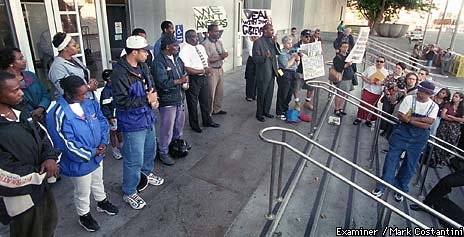
Family, friends demand probe of prisoner's death

Friday, July 2, 1999
SAN FRANCISCO -- Vincent Hines had more than his share of problems with the law during his adult life, mistakes that landed him in San Francisco County Jail.
But his family members wonder if the 45-year-old inmate paid the ultimate price for his role in organizing a jail protest.
Monday, Hines died in a lockdown cell amid a series of questions about the kind of medical attention he received. He ended up in the disciplinary cell for his role last month in a protest over jail conditions.
According to his family, Hines had been complaining for weeks that while in lockdown, jail officials had refused to give him his heart medications. He told them he hadn't been receiving the kind of attention he got in his usual placement: the prison's medical ward.
"From what I hear, it was neglect," said Hines' uncle, the Rev. Robert Greene. "We're not giving anyone the benefit of the doubt. This could have been avoided."
Members of Hines' family and about 50 people gathered for a candlelight vigil in front of the Hall of Justice Thursday evening to remember Hines and call for a full investigation into his death.
Officials from the Sheriff's Department, the Police Department and the Health Department have launched investigations into Hines' death. Hines was found dead in his cell Monday afternoon, just hours after he was examined and cleared by officials in the jail's hospital ward after he complained of chest pains.
Sheriff's Department spokeswoman Eileen Hirst said Hines was one of about 20 inmates placed in "administrative segregation" following an internal jail demonstration June 3, in which dozens of inmates threw their breakfast on the floor to protest conditions in the jail.
Hines had been in the county jail system since last September, when he was arrested on burglary and parole violation charges, for which he was awaiting trial. Police records indicate that Hines had a total of 27 felony and 17 misdemeanor "contacts" with police during a 20-year span, landing him in and out of jail for short periods of time.
Hines had a long history of heart problems, including a heart attack and an angioplasty operation two years ago, and had been receiving medical treatment in the jail.
Shortly after the jail protest, Hines was transferred to The City's jail in San Bruno with other inmates who were involved in the demonstration, Hirst said. But because of his medical problems, he was moved back to the Hall of Justice jail facilities, where he would have more immediate access to medical care.
Early Monday morning, Hirst said, Hines notified sheriff's deputies that he was experiencing chest pains. At the time, she said, the deputies noted that Hines had his medication in his cell with him.
"He told us he was experiencing chest pains, so we immediately escorted him to the jail medical facility," she said.
There, doctors apparently gave him an EKG and determined that he was well enough to return to his cell, Hirst said.
"An hour later, he was found in his cell, unresponsive," she said. He was given CPR by the deputies, jail medical staff and a paramedic unit, Hirst said, but was declared dead at the scene.
Hirst said that while it was clear that Hines had had his medication with him the morning he died, the department will conduct an internal investigation to determine, among other things, whether Hines had continuous access to his medication over the weeks before his death.
The coroners office will also perform an autopsy on Hines, she said.
Hirst said all medical decisions regarding jail inmates were made by medical workers from The City's Health Department, who regularly make rounds of the jail, distributing necessary pills and medications. Jailers have absolutely no say in who gets treated, she said.
Dr. Joe Goldenson, the Health Department administrator who oversees the jail medical program, said his initial review of Hines' records indicated that he had received adequate medical care.
Goldenson said he couldn't discuss the details of Hines' care, because the case was still under investigation and a potential subject of litigation. But he said medical records did not give any indication that Hines had been denied access to his medication.
"People don't die in jail very often, but when it happens, we're very concerned," he said. "From my initial evaluation, it appears that (Hines) did get adequate treatment."
Hines' younger brother Irving said he and the rest of his brother's family eagerly awaited the results of the investigation and autopsy to know whether his brother's death could have been prevented.
"Our main concern is that this does not go on and happen to somebody else," Irving Hines said. "We need to make (the jail) a better place for everybody."